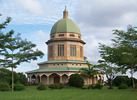In Uganda, according to the census by the Uganda Bureau of Statistics as of 2024, eight of ten Ugandans are Christian, while two are Moslem, and observers of other religions. Freedom of religion is also key, as Uganda was rated 3 of 4 for religious liberty, scored by Freedom House, a non-profit organization best known for religious, political, and human-rights advocacy.
But that’s not all. Religion in Uganda is a major contributor to the country’s social – economic sector, and the role of religion in the tourism sector can not be ignored.

Here’s how religion in Uganda is a major contributor to the tourism industry.
- Local and International Tourism
Uganda’s past and present, through annual observations such as the Uganda Martyrs Day that’s celebrated every 3rd June, has experienced enormous growth.
People trek from various parts of rural and Urban Uganda every year, to observe the Uganda Martyrs Day at the Uganda Martyrs Shrine in Namugongo. Catholics travel from regions as far as Sembabule, Iganga, Arua, and even Congo and Rwanda, to celebrate the day at Namugongo.
Other religious tourists have also flown into the country. This has boosted both local and international tourism, contributing to Uganda’s social and economic growth.
- Social and Economic Growth.
When people travel to Namugongo and for other religious programs such as 77 DOGS previously hosted by the Robert Kayanja Ministries, Consecration Camp as hosted by the James Kawalya Ministries, or even conferences such as the ‘My Great Price Conference’ by Phaneroo Ministries, there is increased trade in the neighborhood and premises near to the venues of these events.
Social -behavioural change is observed, and the economy is boosted through charges and taxes on lodgings, transportation, meals, healthcare, and other sectors.
- Religious Sites as Tourism Destinations
Religion in itself is not only a driver of tourism but also the monuments erected in their various forms. The Uganda Martyrs Shrine, for example, is a must-see for tourists in Kampala, regardless of whether it is 3rd June or not. Other religious monuments include the Baha’i Temple, the Gaddafi Mosque at the heart of Kampala CBD, the Kasubi Tombs, where the deceased Kings of Buganda were laid to rest, Tanda in Mityana, home to Walumbe, the supreme entity over death in Buganda legend and traditional religious practices, Bigo-bya-Mugenyi, Nyakaima’s Tree Shrine, to mention but a few.
All these foster local and international tourism, not to mention the cultural education preservation opportunity that they provide.

